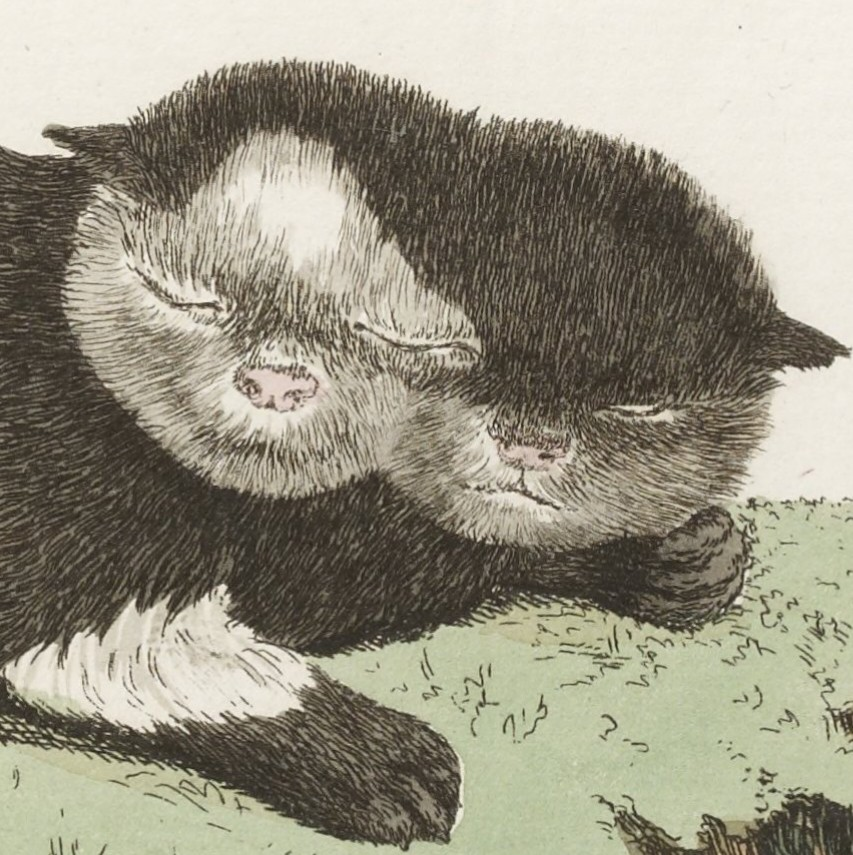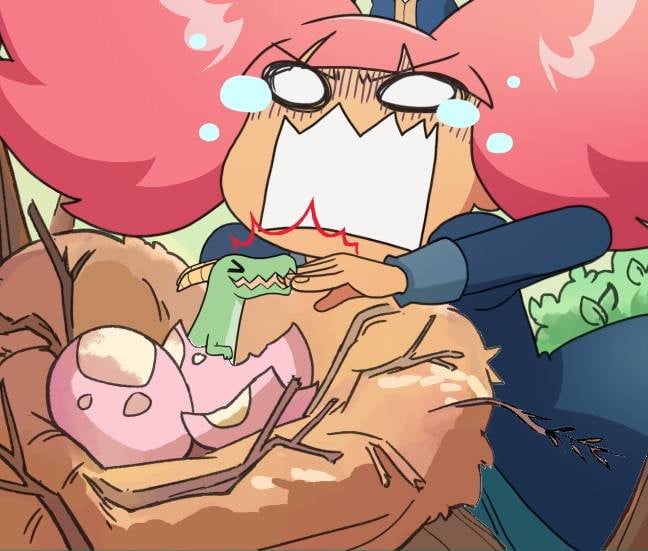Guinea pigs were bred as livestock by the Inca in South America. They used to be a dish reserved for nobility but now us plebs have access to Cuy in the supermarket. 😃
Some people still do raise them for food 🙂
When you’ve got not fridge and the environment isn’t always condusive to curing and preserving meat, it’s very handy to raise an animal that’s a smaller amount of meat (say one meal) than something like a goat, pig, chicken or cow.
They breed easily and rapidly, eat scraps and vegetation that humans normally don’t. So folks keep a herd of Guinea pigs and just slaughter whatever they need for a meal.
It’s very clever and much more environmentally friendly than clearing forest for larger animals.
Reduce, Reuse, Recycle, eat small mammals.
Got it, updated for 2023.
That they would be reserved for nobility seems like it must be wrong. These are tiny animals that wouldn’t take much effort to raise. A small family could easily eat one. Just grab a pair and start raising them.
It’s not like a cow where you need large amounts of grazing land and then when you kill it, you have huge amounts of meat to deal with.
This is why animals in English have three names. One for the animal, raised by the commoners with Germanic origin (cow). One for the meat, eaten by the wealthy with French origin due to the Norman conquest (beef). And one used in scientific contexts coming from Greek or Latin (bovine)
My guess would be the meat to prep work ratio. Smaller game seems like it would be more effort to skin and clean vs. larger ones like turkeys and deer. Just a guess however, anyone know for sure?
It’s surely not any different than a squirrel, ground hog, or wild rabbit. People eat those all the time. Even meat rabbits seem comparable in size to a guinea pig. You can also just put them in a stew.
Also, as I mentioned, larger animals are also more difficult because you can’t just kill one for dinner. If you kill a deer, you have to process it to preserve it or share it with a larger community. Ain’t no freezers.
Side anecdote: My grandfather, as a 9 year old, used to go squirrel hunting and bring them home for his mom to cook. Before you go thinking this is some redneck thing, it was long island, less than 50 miles from Manhattan. It would have been during the war though.
In hindsight my hypothesis seems pretty silly now yeah. Squirrel and rabbit aren’t really considered rich people food here in Pennsylvania, that’s for sure :P Rabbit is delicious. Still have yet to try squirrel as I don’t know any hunters (I’d gotten the rabbit from a farmer’s market)
Your gramps was a champ. The most useful thing I ever brought home around 9 years old was wild garlic.
What’s amusing to me is that lobster is now (sort of) considered rich people food, but it used to be the food fed to slaves and the extremely poor.
He was a really cool guy.
Maybe not “reserved” but eaten less frequent? Let’s say a poor peasant during that time owned 10 guinea pigs and had the choice to either slaughter one of the little guys for one single meal, or sell some to the higher-ups and buy less expensive food that will last for a week or two, then it would make sense if the peasants ate less of them than nobility even if it wasn’t explicitly forbidden.
Why doesn’t chicken have a different name for the meat
Because the poor peasants could afford to eat it and the French version (would be poulet or something like that) never caught on.
Sorry. That was supposed to be in the original comment, but I guess I forgot.
I’ve had cuy in Perú. It’s pretty good and unsurprisingly not unlike rabbit. It’s not much meat considering the amount of work.
Plebs live like past nobility everywhere.
Fun Fact; they’re called “Meerschweinchen” (“little pigs of the sea”) in German as they were imported by Spanish sailors (as food, not as pets). I know they have been used as lifestock in South America way before that, but the sailors were basically the first ever time Germans heard about those animals.
The only thing I find a little weird about this picture is that it isn’t skinned. You can buy frozen whole rabbits in Germany, but they’re always skinned. Is this a hairless breed or did they somehow remove the fur?
From a food travel show some time back, it seems that a lot of places cook them with the hair on. Not all from what I saw, but not unheard of so maybe it’s a “don’t remove the fish head/eyes, some people like it” kind or thing.
Makes more sense than Guinea pigs considering they’re from the other side of the world from Guinea.
I believe Guinea in this case has a similar origin to Guiana.
I think in this time Guinea was a name for a far away place and not necessarily the origin.
Not Guinea, but I saw guinea pigs raised for food in a village in Tanzania. The local who owned them found it hilarious that we keep them as pets in the U.S. He asked me what we call them, and after i replied guinea pig, he said they definitely don’t taste like pig.
There are hairless (mostly) guinea pigs, also known as house hippos. Not sure if that’s what they used here though. I don’t feel like I’ve ever seen an all pink one, they usually have some brown or black but 🤷♂️
House hippos? https://youtu.be/NBfi8OEz0rA?si=ZcYVlRhIeNBcvfxc
house hippos
Damn it, stop making them sound cute. They’re food.
“Mum can I have a guinea pig?”
“We have guinea pig at home!”
guinea pig at home
Pretty genius. Should sell more pets this way and cut out the pet-store middleman altogether.
What, you guys eat pig all the time. Frigging humans, ooo I like eating the flesh of animals. Not like that!
This absolutely crossed my mind earlier today when I ate rice and shrimp that I had to peel for myself. Their long antennae things and little legs made me think of the time I heard someone say that they’re the cockroach of the sea. They may be, but I still ate the shit out of them and they were absolutely delicious.

Lobsters are the cockroaches. Shrimp are more like, crickets maybe in the pecking order of the food chain and shell density. But basically all the shellfish with exoskeletons are super similar to bugs. Crabs are clearly basically spiders.
And if you can accept that, you can eat land-based insects, which honestly, in general, taste fine.
I’m not sure why someone is so disgusted by eating a pastry made with cricket flour but can eat a whole plate of shrimp they have to peel themselves.
For me, I’d have a hard time eating whole bugs because it’s all shell and little meat, and I imagine the texture to be off-putting. Also, I’ve kept crickets and they’re so stinky.
‘you guys’
‘Frigging humans’
…Are… are you not a human?
Asking for science, naturally.
A dog can’t use a computer. That’s crazy.
*Guinea pork
which supermarket? asking for a Peruvian friend
It’s in Apple Valley MN.
Happy I’m vegetarian. This looks terrible.
Thank you for letting us know.
They always do.
I mean, there’s vocal people everywhere. Without fail, when I see a picture or a video of a cow or pig being cute, there’s at least 10 people thinking they’re the height of comedy by saying “oh yummy, steak/bacon”.
No question about that, and I find it equally irritating.
I bet this one doesn’t even pocket-mulch.
Shameful
There are people talking about eating meat here more than saying they won’t… why do they get a free pass? What’s really the difference here?
The people saying they’d eat a meat product in a thread about a meat product aren’t here just to wave their smug superiority around.
deleted by creator
You know that meme where it’s got all these animals lined up left to right and the message is “where do you draw the line”? I’d think probably just before this animal is a good starting place
Guinea pig was one of the main meat sources for the Inca. I don’t mean that as an argument, just interesting.
Why?
I kind of agree… I’ve been around these things, and they are incredibly stupid.
I guess I’d draw the line around them purely because in western culture these are pets… But I think practically speaking these are a lot better than actual pigs, which are very intelligent.
We have very strange eating habits when you really think about it.
It always amazed me that the anti-abortion people and the vegetarian people had basically no overlap. Supposedly “pro-life” with no exceptions… unless it’s this pig I want to eat. But that fetus with encephalopathy? That baby deserves every second of his tortuous, miserable life. All 38 hours of it.
Really tips you off that it’s actually about controlling women’s bodies for them and not really about “saving lives”
I have a friend who is both anti-abortion and vegetarian. She’s not the most logical person all the time, but she’s really consistent on this one. I vigorously disagree with her anti-abortion stance, but I admire her consistency, if that makes sense.
The lines are completely arbitrary. Cows and pigs are at least as affectionate, social, and intelligent as dogs, so why draw a line between them?
Which is funny, because it’s entirely normal in western culture to eat the very similar looking, long-eared version.
They’re especially hairy rats. I’d rather people eat rats than cows.
They’re alive right, how do you thaw them out, I assume the microwave would kill them?
Fun fact: the microwave was invented to thaw shock frosted mice to revive them.
What
That was one of it’s first uses, but not why it was invented. Originally used for food and tested in restaurants and kitchens.
Also the rats weren’t technically frozen, just close to freezing…
Yum! My python gonna enjoy this GP
It goes for dead ones?
You heat them up in hot water first, mice tea
Sounds like a very well-mannered snake, just in time for brunch!
Frozen/thawed feeding is very common in modern reptile keeping.
It’s convenient to keep 3 months of rats in the freezer, pre-killed means they can’t injure the snake, and freezing them helps to kill off parasites.
Some places have their own “weird” delicacy that throws people off. Dogs in Yuan, maggot cheese in Sardinia, undeveloped ducks or stewed frogs in the Philippines, and so on. So, I’m not going to knock this at all.
Tbf, I’ve read about this as a teen a long time ago (GQ) and was fascinated by the irony of having the guinea pig in a cartoony sketch on the wrapper while seeing their corpse through the plastic.
Yeah it was more the cutesy picture that threw me off. Most of the meat I buy just has a silhouette of the animal in question.
I guess it’s not the worst idea to have a greater understanding, and hopefully respect, of where your food comes from.
Meet your meat!
deleted by creator
How is this different from eating pig or cow? It’s all mammal in the end. People eat rabbits too.
No it’s for people. Guinea pigs are raised for food in Peru.
Yeah, can’t see it for any other reason than large reptiles. Though the people I know that keep snakes usally prefer live bought rats.
Edit: Thank you to those who pointed out my lack of culinary knowledge in an informative manner.
Well, it’s like a Cornish game hen, just not for people in North America.
Ah, well maybe certian parts of North America. I used to work with a guy who ate seagull eggs (from a small fishing outport in NFLD) and appartently they are not much different from chiken eggs. TIL.
Guinea Pig is on the BBC’s list of 50 foods to eat before you die. Or it was when I started eating my way through it years ago. I think it’s the only one I haven’t had.
Nope, people food in the Andes.


















